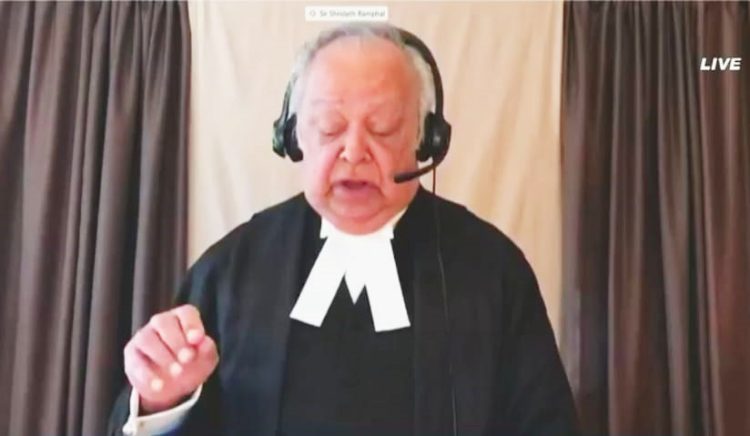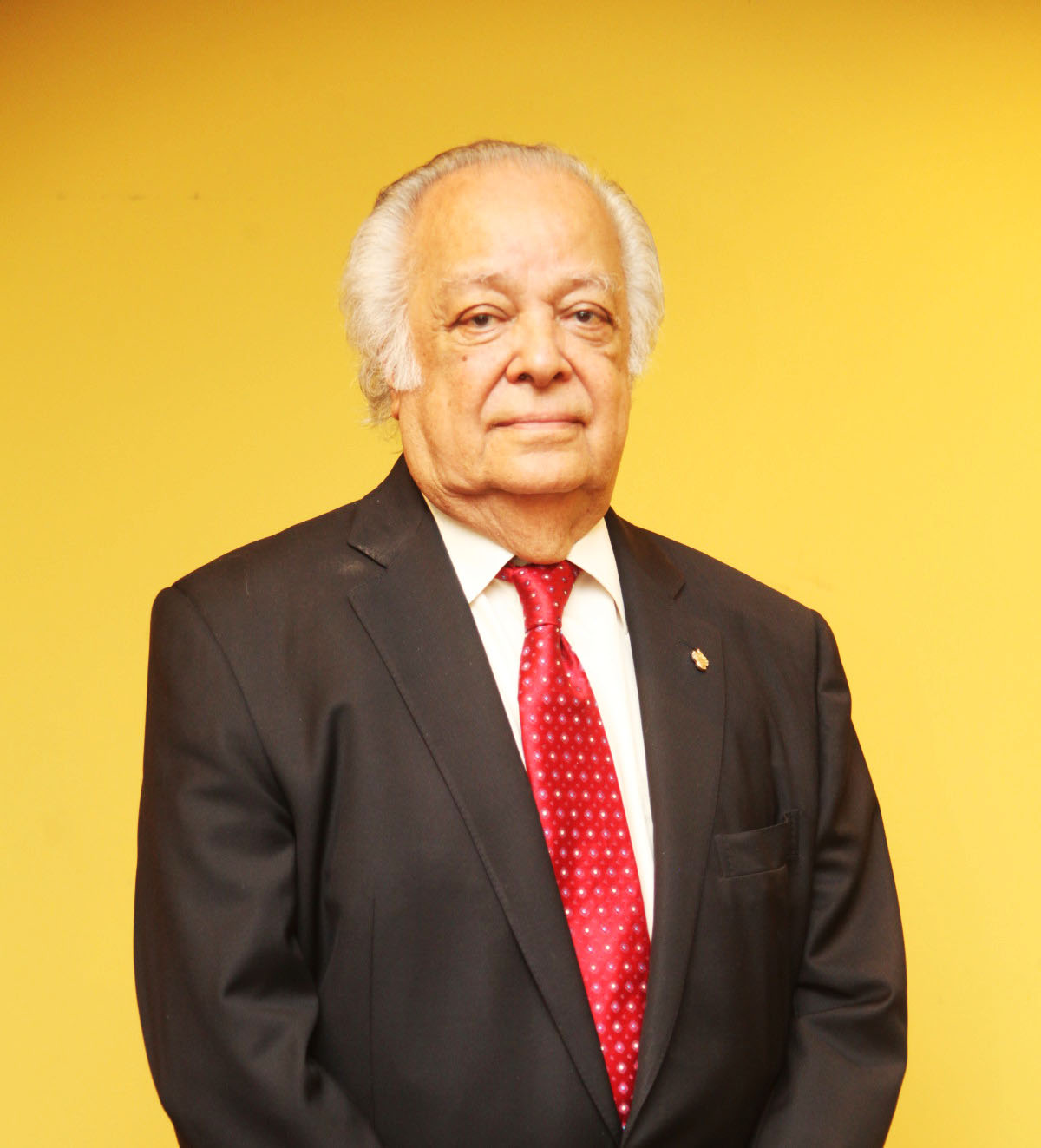By R M Austin
I do not propose to spend much time writing about the impressive achievements of Shridath Surendranath Ramphal. This has been done in good measure by the many, including diplomats and politicians, who expressed condolences on the occasion of his passing on 30th August, 2024. I prefer to speak of him as I had known him from the time I entered the Ministry of Foreign Affairs to the time of his death. It is a remarkable fact that regardless of the capacity in which he was serving, Shridath Ramphal always found the time to answer any query I made. Before I proceed let me emphasise that I will not make reference to Ramphal’s politics or how he conducted his personal life. I leave this to current critics of the man and those who feel dwarfed by the magnificence of his accomplishments.

Foreign Affairs
I first encountered this remarkable individual when I entered the Ministry of Foreign Affairs in the early seventies. He met me at a social event and he thought that I had been misplaced professionally by being appointed a clerk in the Public Service Commission. My background and schooling made me a good candidate for the Foreign Service. Shridath Ramphal suggested that I report to the Ministry of Foreign Affairs, which I did. Interviewed by Rudy Collins, I was almost immediately attached to Lloyd Searwar’s Political Section of the ministry. It was he who dispatched me to Ramphal’s office to get a letter to take to Prime Minister Burnham’s office.
Ramphal’s office was superbly appointed and elegant. I was watching an individual who was in prime mental form. He was self-confident, at ease with himself, and clearly seized with the significance of the portfolio that he held. I therefore watched closely as he dictated a letter to Burnham about the 4th Summit Conference of Non-Aligned states to Patty Fung-On, his then secretary. At the end of the dictation, Fung-On took the letter to her desk, typed it and returned to Ramphal. There was no revision. I looked at this entire exercise in fascination. I had only read before of such perfect dictating skills being possessed by men like Winston Churchill.
The Foreign Ministry at the time was a bustle of activity. Coming off the success of the Foreign Minister’s Non Aligned meeting one could sense the energy released by this development. One could see it in the body language of its impressive staff: Collins skilfully administered the Ministry creating the space which made it a comfortable working environment; Searwar was in the attic feeding ideas to Ramphal’s office; Rashleigh Jackson, though far away in New York, kept the ministry’s work in the international news; Elsa Mansell, with skill, poise, and deft touches made the conduct of Protocol a joy to watch; Dennis Benn proved that economics did not have to be a “dismal science’; and the combined knowledge of Cedric Joseph, Lionel Samuels, and Harold Sahadeo ensured that the ministry did pertinent and timely analyses of the great issues of the day. Ramphal sat atop this galaxy of talent marshalling it and directing it in such a way that in a mere six years after Independence, Guyana produced some of the best diplomats regionally and internationally. This is no hyperbole. The likes of Dr Barton Scotland, Dr Dennis Benn, Duke Pollard, Searwar and Joseph, among others, won enviable international reputations on the basis of their diplomatic work.
Departure
As a young officer, I learnt with some sadness that Mr Ramphal was going to leave the ministry in 1975. Some time before he left, he asked me to have all of his speeches typed-up and placed in folders. With the permission of the Permanent Secretary, I gave the assignment to Miss Elvin Odle. She typed over a hundred speeches on an old typewriter, a machine, I might add, where if a mistake were made, the entire page had to be redone. This testing and challenging exercise completed, I asked Ramphal if I could go to see him at his Bel Air Park home and handover six folders of his speeches.
When I arrived at his home, a relaxed Ramphal took me into his garden where we sat facing each other. As he spoke, it dawned on me why he was leaving. It was clear that he was unhappy with the new socialist orientation of the administration that he once served and had clashed with some of the top officials.
Here, it might be good to deal with a recurrent rumour or allegation. The myth that Ramphal and Burnham had become enemies in subsequent years cannot be sustained. Among other things, the close nature of that relationship was evidenced by the fact that Ramphal got Burnham to purchase the Belfield property from his uncle, suggesting that a bond had been formed which could not easily be broken over politics or individual ideology. Although they had differed politically, they retained a respectful relationship.
I sat in Mr Burnham’s office in 1981 when he was trying to find a diplomatic means to blunt the psychological effect of the summary rejection of the Protocol of Port-of-Spain at the end of his visit to Venezuela in 1981. No solution could be found by those around Mr Burnham at the time, and these included some of the country’s finest minds. A pensive Burnham called Ramphal late in the evening. I heard Ramphal recommend that a visit to Brazil would have the effect of rendering the Venezuelan refusal to renew the Protocol of Port-of-Spain nugatory and persuade Caracas that Guyana still had powerful friends. A relieved Burnham began to prepare for a visit to Brazil not long after this meeting ended. Ramphal also helped the Burnham administration, especially as it related to negotiations with international financial institutions in the difficult period of the eighties and there were regular personal exchanges on the telephone.
The defence of Non Alignment
But I seem to have run ahead of myself. I must relate that Ramphal ensured that I attended the Algiers Summit where, at a very young age, I was privileged to meet such great Third World leaders as Prince Sihanouk of Cambodia and Michael Manley of Jamaica. I also saw President Boumedienne of Algeria in the distance. Once, and accidentally, I ran into Madame Binh, the famous North Vietnamese negotiator. After the Algiers Summit, Ramphal directed that I attend the 1973 United Nations General Assembly Session. There, I was to have an unforgettable experience. After the formal opening, we listened
to many speeches. Then Henry Kissinger, easily one of the most powerful men in the United States at the time, took the floor and denounced the Non-Aligned movement, a main pillar of Guyana’s Foreign Policy. These were his words: “As tension between the two original blocs has eased, a third grouping increasingly assumes the characteristics of a bloc of its own – the alignment of the nonaligned.”
Ramphal replied the next day. His speech, which was prepared in his hotel room with the help of his delegation, was eloquent, strong and pointedly relevant. Ramphal surveyed the global scene. He emphasised the role of the UN. He then turned to the role of the Non Aligned Movement and delivered this unforgettable defence: “If the commitment [of the Non Aligned States] makes us aligned, this is at least an alignment with the deepest purposes of this organisation. It is an alignment with the spirit of the Charter; it is an alignment with the cause of internationalism; it is an alignment that brings strength to the United Nations system, not one which seeks an aggregation of power outside of it.”
The response to Kissinger drew enthusiastic applause from the General Assembly. I was never more proud to be a Guyanese diplomat. Later in my life, I came to realise that it was this performance, as well as the role he played in getting China seated in the United Nations General Assembly in 1971, among other perceived sins, that scuttled Ramphal’s chances of ever becoming Secretary General of the United Nations. Neither superpower, the USA nor the USSR, wanted another Dag Hammarskjold, on their hands. Like him, Ramphal might have been dangerous and hard to control.
Ramphal House
After his election to the position of Commonwealth Secretary General, I remained in touch with him mainly through his secretary, Greta Cummings. Ever so often I would pass a note to him on a specific matter and I always got a response. However, I had to follow this phase of his diplomatic career at a distance as he assumed the mantle of statesman, helping to bring Zimbabwe and South Africa to deserved freedom and served on all of the Global Commissions dealing with development, disarmament, and the environment. The next time I saw him was when he came to Guyana to sign copies of his Memoir “Glimpses of a Global Life.” We exchanged greetings but it was not convenient to have an extended conversation. I was therefore pleased when our paths crossed again when he returned to Guyana to open Ramphal House in February 2020. We had a long conversation at the Pegasus Hotel. He shared his concern and anxiety about the future of this country. In particular, he thought the coalition government had not utilised the opportunities which had presented themselves when it acceded to office. In particular, he questioned me closely about the personal dynamics at the top of the government. He could see that the two key men at the top of the government did not have a common perspective on the politics of the nation or share an equally common vision for the nation. I could see by his expression that he was once again agonising over the fact that Guyana seemed not to be taking a road to its own salvation and prosperity.
But Ramphal was not a man to lapse into pessimism for too long. As he got up to take me to the door of his hotel room, I could see that his optimism had returned. His bright smile returned. In his long view of things, Guyana would come through. On my way out, I noticed that his suitcase was open and there were at least six books in it. I enquired as to whether he still read that much. Ramphal gave an immediate affirmation. That visit ended on a good and uplifting and personal note for me. After he had opened Ramphal House and as he was about to leave, he wrote me a most gracious and personal note in gratitude and appreciation. I have dutifully kept it.
Farewell
In the last period of our extended relationship, I was in contact with Ramphal as a member of the Guyana delegation to the International Court of Justice (ICJ). When I communicated with him, I could tell that even at his advanced age, that he was still mentally vigorous, and I could understand how it was that at 92 years of age he could address the ICJ in defence of the territorial integrity and sovereignty of the country that he loved. Need I say that his passing is deeply shocking and hard to absorb or believe? I will miss that eloquent voice, that generosity of spirit, the determination to fight for justice in whatever form or shape it took, the ringing eloquence in the many multilateral fora and the beauty of the language he used to write personal Notes or compose speeches and reports. The words of Nelson Mandela in 1990, who got to know Shridath Ramphal very well, might be the best epitaph: “He is one of those men who have become famous because, in their fight for human justice, they have chosen the whole world as their theatre.”
(R M Austin was a former Ambassador of Guyana to the People’s Republic of China)





